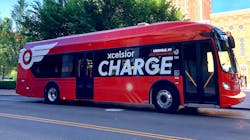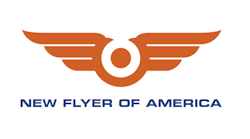CTDOT scheduled to deploy first full-size automated transit bus in North America
Connecticut Department of Transportation (CTDOT) plans to test the first full-size automated transit bus project in North America. A federal grant and project partners New Flyer of America Inc., Robotic Research LLC and The Center for Transportation and Environment (CTE) and working to meet an anticipated start date in 2021.
The automated technology will be tested on the CTfastrak bus rapid transit corridor, which is a dedicated nine-mile route between New Britain and Hartford. The demonstration project will see the deployment of three 40-foot battery-electric Xcelsior CHARGE™ heavy-duty transit buses from New Flyer with Robotic Research’s proprietary AutoDrive® advanced driver-assistance system. New Flyer Infrastructure Solutions™ will support the installation and integration of the electric bus charging equipment. CTE will serve as the project manager and provide technical assistance, including route energy modeling.
“In the realm of public transit, automation can deliver significant benefits to battery-electric buses,” said CTE. “Automated driving supervised by a human operator can improve accessibility for disabled and elderly riders, increase energy efficiency from driving, and may offer operational flexibility by eliminating the need for larger 60-foot buses to serve high-ridership routes.”
CTDOT explains the automated technologies demonstrated will include steering, precision docking at CTfastrak station platforms and platooning, all of which can enhance service and improve safety for drivers and passengers.
Robotic Research points out that as the first program to deploy automated heavy-duty transit buses for revenue service in North America, it will naturally also create two additional technology innovation moments for U.S. mass transit, including the first automated Bus Rapid Transit line and the first application of automated precision docking to minimize platform gaps; ensure ADA-compliant level boarding; and increase accessibility for all passengers.
“This is an incredible moment for the advancement of automated technology in public transit, and for the continued development of safe, smart, sustainable and connected mobility across North America,” said Chris Stoddart, president of New Flyer.
The buses installed with automated technology will only operate with the automated technology on the CTfastrak separated guideway and will always have a driver behind the wheel to take control if necessary. An operator will manually drive the buses on downtown Hartford’s mixed-traffic roadways, and precision docking at station platforms will be performed at low speeds. Extensive testing using an off-road test facility will occur first, and then on CTfastrak without any passengers prior to launching the demonstration.
The project is being supported with a $2-million Federal Transit Administration grant awarded through the Integrated Mobility Innovation (IMI) Program. The project was one of 25 to receive funding through this round of funding through the IMI Program, which supports projects that use innovative technologies and processes to improve access to public transportation, increase public transportation efficiency and enhance the overall rider experience.

Mischa Wanek-Libman | Group Editorial Director
Mischa Wanek-Libman is director of communications with Transdev North America. She has more than 20 years of experience working in the transportation industry covering construction projects, engineering challenges, transit and rail operations and best practices.
Wanek-Libman has held top editorial positions at freight rail and public transportation business-to-business publications including as editor-in-chief and editorial director of Mass Transit from 2018-2024. She has been recognized for editorial excellence through her individual work, as well as for collaborative content.
She is an active member of the American Public Transportation Association's Marketing and Communications Committee and served 14 years as a Board Observer on the National Railroad Construction and Maintenance Association (NRC) Board of Directors.
She is a graduate of Drake University in Des Moines, Iowa, where she earned a Bachelor of Arts degree in Journalism and Mass Communication.




